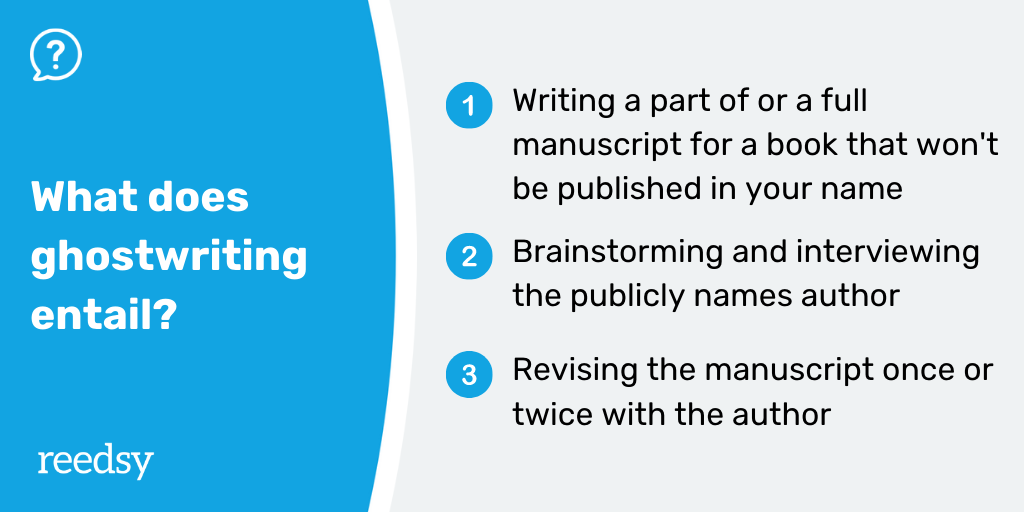How To Get Into Ghost Writing
Becoming a ghostwriter might not be every writer's dream, but it's certainly a noble one. Whether you're writing novels or business books, you'll be helping someone tell their story without expecting any credit — though of course, you can also make a pretty penny as a ghostwriter. We've seen our fair share of successful ghosts on Reedsy, and some of them will be sharing how to become a ghostwriter in this post. There are five steps in total, so buckle up and let's go.
1. Understand what being a ghostwriter means
Understanding the job description is the first step to doing anything well. Well, what is a ghostwriter? A ghostwriter is someone who works on a manuscript that will be credited to someone else. This may be the entire book or just parts of it, but either way, the "ghost" will often not receive public credit (unlike a listed co-author).
Usually, the ideas and knowledge contained in the book come from the publicly named author — the ghost only puts these ideas into words. As such, being a ghostwriter means you'll have to work very closely with each author, noting down their detailed thoughts and overall style so that you can convey them seamlessly in the book.

Learn more: What is a ghostwriter and what types of ghostwriting can you do?
Is ghostwriting legal?
Ghostwriting is very much legal, so long as the idea behind the book is the author's. You're essentially offering a service, like an editor of sorts, to realize that vision.
In some cases, like The Autobiography of Malcolm X, the ghost may even be credited on the cover. If the author agrees to share the credit, your name will often follow the phrase "as told to" on the cover or front matter. Otherwise, the author might also name you in the acknowledgements. Don't be perturbed if you don't receive any public credit, however; it's par for the course in publishing, and perfectly legal so long as you still get paid.
How much do ghostwriters make?
From the data we've gathered from the hundreds of collaborations on Reedsy, a ghostwriting project can earn you anywhere from $2,000 to $60,000. And if you're writing for a celebrity or a high-profile author, you can expect a six-figure payment for a book! A number of factors contribute to how much ghostwriters make, but the general rule is: the more experience you have, the better your income will be.
2. Kickstart your career with freelance writing
We know you're eager to write a full 50,000-word book (and get paid for it) as soon as possible, but it's not so simple. Most authors would first need to have a general idea of your authorial voice and range of knowledge, to see whether you're compatible with their own book idea. This is why having some previous work to demonstrate your talents is absolutely crucial — and why we recommend you start with freelance writing first.

Test out various styles and topics
There's no better time to experiment than now. Don't limit yourself to just one or two categories of work — spread your wings and fly! Send pitches to magazines, blogs, and newspapers; write op-eds, listicles, and even short stories. Indeed, if you hope to become a fiction ghostwriter, make sure you're not just writing articles constantly, but also adding some fiction creds to your portfolio.
One of Reedsy's most popular ghostwriters, Sally Collings, encourages you to find opportunities to practice your skills even in the most unexpected places: "Find individuals or organizations who need help writing the 'About' section for their websites. Most people just don't know how to make their own story shine, and it can be very helpful for them to draw on your storytelling skills."
Alternatively, you can also act as an actual editor, assisting authors with manuscripts by refining their structure or voice (though not doing the writing yourself). "This will give you real-world experience collaborating with clients and shaping a manuscript — without tackling the heavy-lifting of concept development," Collings shared.
Finally, keep up with your favorite publications on Twitter to see when they're calling for pitches. When you do send something in, remember to personalize your note to them, and to be concise — editors often have a lot of submissions to go through.
Build your portfolio
Once you have a decent idea of what you really like and are good at, then you can home in on it. It's important to keep writing on a variety of topics — but it's also crucial to write regularly in the field that interests you, according to Stacy Ennis. "One of the best ways to be seen as an authority in an industry is to be the most consistent person talking about it."
As your writing portfolio grows, Collings advises you to "create a website and professional email address. Order business cards. Start professional social media accounts. Update your LinkedIn profile with the title 'ghostwriter.' Begin calling yourself a ghostwriter when you meet people. Basically, treat it like a business and be prepared when it comes time to offer your services." And with plenty of solid freelance work under your belt, you should be well-prepared for this next step.
3. Consider writing your own book
You wouldn't expect a dabbling songwriter to write a hit album without a little more practice — and neither would expect to be writing a bestseller with only some freelance writing experience. You'll probably need to sharpen your book-writing abilities before you offer to write one for someone else. This is exactly what Mike Towle advises as a ghostwriter of over 25 years:
"How can you write a book for someone else, in their voice, when you've never written one yourself? So write your own book first — better yet, write two or three. Shoot for at least 50,000 words each so that you get a feeling for writing something that long: dealing with the nuances of voice, narrative, flow, etc."
Feeling intimidated by the prospect of transitioning from short-form to long-form works? Don't worry, we've got you covered with some handy resources about writing a book.
- How to Write a Book in 15 Amazingly Simple Steps
- How to Write a Nonfiction Book in 6 Essential Steps
- Pro Tips: Turning Your Blog into a Book
4. Find opportunities in your network
Having leveled up your skill with a quill through various smaller projects and possibly your own book, it's time to look for something more substantial from your clients. The good news is that through your freelance work, you've created a network and a reputation that can help you advance in this next step of becoming a ghostwriter. Below are a few ways you might use those assets to nab your first big ghostwriting gig.

Check up on old clients
As New York Times bestselling ghostwriter Susy Flory puts it: "Everyone has a potential book in them, so have your antennae out." Many of your previous clients probably already have interesting stories in them — don't hesitate to let them know you're available as a ghostwriter.
That said, don't just indiscriminately take on new books to write! Hold out for real passion projects for which you are uniquely qualified. "Your first couple of collaborative projects will likely come from your gut feeling that a particular book needs to be born and that you are the one to help make it happen," Flory adds. In summary: cast a wide net, but only reel in the fish that look genuinely good to you.
Join a marketplace
Struggling to make any headway with your previous clients? Perhaps it's time to expand your network by joining a marketplace. There are various freelancing sites for writing jobs that you can join, but publishing-specific ones like Reedsy are more likely to bring you serious requests and lucrative collaborations.
Looking for a professional editor, designer or marketer?
The best are already on Reedsy, come meet them!
Learn how Reedsy can help you craft a beautiful book.
Charge less in the beginning
Speaking of money, though, you should try to prioritize experience over money at this stage, as long as you have the luxury to do so. Freelance ghostwriter Toni Robino suggests viewing this early phase of your career as a "breaking in" period.
"There are lots of things you'll need to learn about how to conceptualize, structure, and ghostwrite a full-length book. For that reason, you'll have a much better chance of getting hired if the fee you set is lower than the fees set by experienced ghostwriters with established track records."
That said, you should never undersell yourself or fall into the trap of freelancer scams. The absolute minimum you should accept for ghostwriting a book is $2,000 — and of course, with every new skill and project you add to your resume, your rates should be going up.
💡 Hungry for more tips? See what ghostwriter David Congreave has to say about landing constant new ghostwriting jobs.
5. Strengthen your collaborative skills
Ghostwriting is very much a team effort, so you need to be able to work and communicate with your clients effectively in order to succeed. Again, these soft skills often come with practice, but here are a couple of things Reedsy's ghostwriters emphasized so you can keep them in mind front he get-go.

Write a clear proposal or contract
Start off on the right foot with each client by creating a good freelance proposal that not only covers the terms of the contract, but also answers any questions that might arise from someone who's never hired a ghost before. A sound contract clearly states the responsibilities the ghostwriter has, how many interviews or brainstorm sessions there might be, how many rounds of revision you would go through, and terms of payment.
Alice Sullivan, the ghost behind 11 New York Times bestsellers, says that when preparing a ghostwriting contract, you should absorb all the information you can on both business and creative matters. The creative part is usually a given, but on the business side: "It's in your best interest to research everything you can about pricing, contracts, and administrative tasks (like taxes)." Remember, you're basically running your own small business as a ghostwriter, so make sure your contracts are thorough and professional enough to reflect that.
Become an expert interviewer
Award-winning ghostwriter Jon Reiner says that a successful ghostwriter is "first a good listener, and then a good writer." Listening to your clients, asking them the right questions, and noticing their manners of speech and their perceptions will all help as you proceed to construct their voice on paper (or, rather, on a Word document).
Just how important is this? British ghostwriter Johnny Acton suggests thinking of it in terms of voice; you must pay attention to ensure your writing actually sounds like the client. "If you write the football player Wayne Rooney saying something like 'I was the most precocious of my numerous siblings,'" Acton notes, "then something has obviously gone wrong."
Diversify your voices
We don't mean honing your best Daffy Duck or Arnold Schwarzenegger impressions. We mean that you have to be able to take what you've learnt from the interviews with the author and wear it like a coat, slipping in and out of different, diverse experiences and "voices" without skipping a beat.
"The hallmark of a great ghost is the ability to make the final product sound like your client, to capture their energy and their vision," says ghostwriter Hannah Sandoval, who has worked on over two dozen manuscripts. "The only way to get good at this is to force yourself to write outside of your usual voice and your genre comfort zone. Try mimicking the styles of some of your favorite authors in short exercises in your spare time."
6. Maintain good relationships with your clients
Once you're a smooth and skilled collaborator, you should have no trouble picking up clients — but you also want to set up and maintain good relationships with the clients you do have! This starts with establishing realistic expectations between the two of you, and continues with relatively frequent, informative communication about your progress.
"Be prepared to educate your clients," advises freelance ghostwriter Doug Wagner. "One of the most common problems I've encountered with clients is unrealistic expectations — especially with regards to voice. Clients need to understand that no writer nails someone else's voice on the first try, and shouldn't be expected to. That's inevitably a product of a back-and-forth.
"Ensure you communicate this with clients before you begin so they're as prepared for the process as possible."
And don't forget to regularly ask for feedback along the way. As freelance ghostwriter Nick Brown points out, starting out small can be a great way to pick up some bona fides as a writer. "Establish a strong record with your own work first. If you can point to good reviews, you will appeal to potential clients."
And with that, we've covered the basics of how to become a ghostwriter. As with any freelancing trade, it involves a lot of networking, and the beginning can be a bit of an uphill climb. But keep at it, and you'll get to see your writing sitting on the shelves some day!
How To Get Into Ghost Writing
Source: https://blog.reedsy.com/freelancer/how-to-become-a-ghostwriter/
Posted by: goodwinengifiricent.blogspot.com

0 Response to "How To Get Into Ghost Writing"
Post a Comment